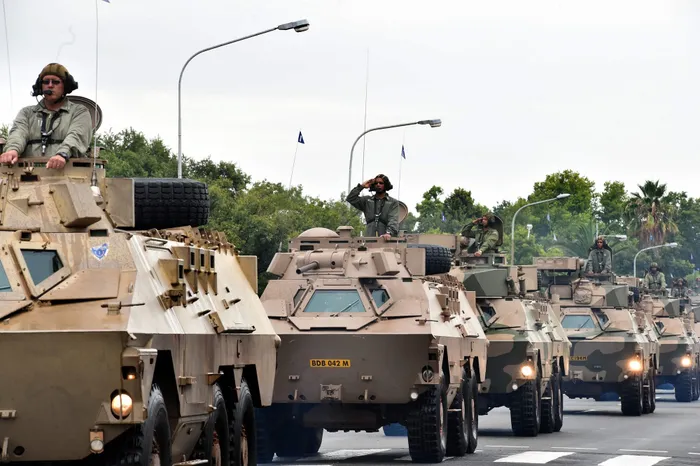Minister moves to end oil giants' stronghold on SA Military
FUEL SUPPLY

The Air Force, Navy, and Army do not manage their own fuel reserves; they rely on supply chains run by companies primarily focused on shareholders in London, Geneva, and The Hague.
Image: Picture: Elmond Jiyane (GCIS)
Defence and Military Veterans Minister Angie Motshekga has thrown her weight behind a historic government effort to end a 63-year-old monopoly by five multinational oil companies —Shell, BP, Engen, Total, and Astron Energy — over South Africa’s strategic fuel infrastructure.
In a letter dated July 2025 and seen by The Star, Motshekga declared the Defence Department’s readiness to serve as a co-applicant in restructuring fuel storage arrangements that have allowed foreign-owned companies to effectively control South Africa’s military fueling operations.
She warned that the current structure leaves the country dangerously exposed in times of geopolitical instability.
“The fragmented and privatised structure of port fuel infrastructure undermines national preparedness and leaves the State vulnerable,” Motshekga wrote.
Her intervention follows a diplomatic embarrassment during recent BRICS military exercises, when the oil majors refused to refuel Chinese and Russian naval vessels docked in South African ports— forcing them to source fuel from Mozambique instead. The refusal was seen as a direct challenge to South African foreign policy and a stark demonstration of the companies’ power to override state decisions.
Foreign Boardrooms Dictate Military Readiness
Senior defence officials have long raised alarms about the military’s dependence on foreign-controlled companies to maintain operations.
The Air Force, Navy, and Army do not control their own fuel reserves and are instead reliant on supply chains managed by companies with primary allegiances to shareholders in London, Geneva, and The Hague.
“We’re the only country in the world where the military has to ask permission from foreign oil companies to defend its own territory,” said one senior military official.
During recent regional tensions, planners discovered that the Defence Force could not sustain extended operations without the explicit cooperation of these companies — effectively placing South African sovereignty at risk.
Leases Expiring, Window for Reform
Transport Minister Barbara Creecy now faces a defining decision.
The lease agreements that give these oil majors control over key strategic fuel storage facilities —most notably at Island View Terminal in Durban — are set to expire on August 31, 2025. The terminal handles 74% of all fuel imports into South Africa.
This expiry presents a rare and powerful opportunity to restructure the fuel supply chain, open the sector to competition, and assert state control over infrastructure essential to national defence and foreign policy.
Motshekga has offered to participate in “joint planning sessions with CEF and your Department to structure a feasible operating model that reflects the national interest,” indicating a new level of interdepartmental cooperation to challenge corporate dominance.
A R1 Trillion Stronghold
The five oil majors, while not owning the physical infrastructure, have maintained tight operational control over it for decades.
This includes not only Island View, but also other key storage and distribution hubs at major ports around the country.
Despite using state infrastructure, these companies have profited immensely while blocking meaningful black economic participation.
Insiders say they’ve perfected a system of pseudo-transformation, offering small, token allocations to black-owned entities that are commercially unviable — ensuring real control remains unchanged.
The BRICS incident exposed their influence further. According to a senior energy source, “These companies showed they could override government decisions simply by refusing service. It was a direct challenge to South Africa’s foreign policy.”
State Sovereignty, Not Just Economics
Motshekga’s letter reframes the issue beyond economics, casting it as a matter of constitutional obligation and national security.
“Repositioning the State — through CEF and with the support of departments such as Defence, Transport, and Mineral and Petroleum Resources — is essential for regaining control,” she wrote.
Her department has offered technical and policy input to guide a new fuel infrastructure model that ensures the Defence Force can operate independently of foreign private interests.
A Test of Political Will
Industry insiders say the lease renewal represents the biggest empowerment opportunity since 1994, with the potential to democratise the fuel value chain and open the door for new entrants.
But the oil majors are fighting back. According to sources, they are deploying high-level lobbying, issuing warnings about fuel supply disruptions, and leveraging long-standing political connections to retain control.
“The majors have turned our own infrastructure against us,” said one emerging industry player. “They use state assets to maintain colonial-era power relationships and block transformation under the guise of BEE.
”The decision facing Creecy and the Cabinet is clear: renew long-standing leases and entrench the status quo for another two decades, or risk short-term turbulence to pursue long-term national security, energy sovereignty, and economic transformation.
With the Defence Minister now firmly in support of change, the oil majors face their most serious challenge since entering South Africa over six decades ago.